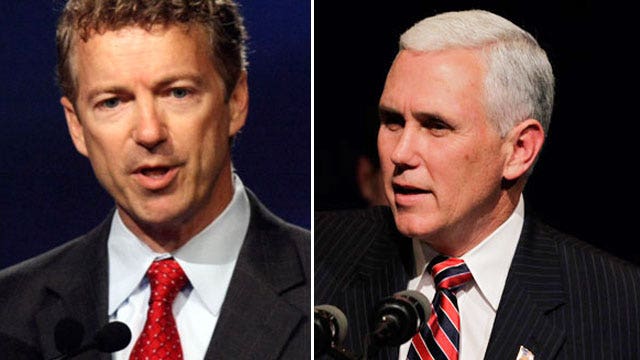2016 presidential prospects seek two offices at once
David Mercer and Matt Keelen discuss the political futures of Rand Paul and Mike Pence
The dreams of a White House run for at least two potential Republican hopefuls could come to a screeching halt if they can't surmount state laws prohibiting them from running for two offices at once.
Sen. Rand Paul, R-Ky., and Indiana Gov. Mike Pence are mulling runs for president -- but both are up for re-election, too, and live in states which would force them to choose one race over the other.
Norman Ornstein, political analyst for the American Enterprise Institute, said the conundrum "isn't new." But this cycle is different, he said, in that it involves "two very high-profile" candidates who could be "serious, possible nominees" -- if they aren't thwarted by state election laws first.
At this stage, Paul has far more presidential buzz surrounding him than Pence, but both have allies in the state legislature looking to help them run for two offices.
Pence hasn't commented about the matter, but a Republican-sponsored bill in his state is awaiting action in the upcoming General Assembly session which would allow his name to appear twice -- as a gubernatorial candidate and presidential candidate, if he chooses to run. If the bill passes, he would have the liberty of signing it.
It wouldn't be the first time Indiana decided to give its politicians such a break: former Republican Sen. Richard Lugar got an exception to run for president and former Democratic Rep. Lee Hamilton was given one, too, when he was considered a potential vice presidential candidate -- though both men's prospects never went very far.
Meanwhile, a bill introduced in the Kentucky state Legislature by Republican state Sen. Damon Thayer last year would have changed the law to allow Paul to run for both offices, but it was eventually killed by majority Democrats in the House. Prospects for another go at a legislative remedy appear dim as Democrats held on to that majority in the last election.
For Kentucky Republicans, the issue of what happens to Paul if he chooses to run for president is looming large, especially since he is considered one of the national party's top potential candidates. Paul already has announced his re-election campaign for Senate.
"There is no question that the Democratic-controlled House will not take it up," Kentucky GOP Chairman Steve Robertson said. He said it may come down to Paul litigating his way onto the ballot for both Senate and White House. Political analysts say the Paul team would likely challenge the law on constitutional grounds, charging that federal rules only should govern federal elections.
Paul's office did not return a request for comment from FoxNews.com.
The state party also has the option of switching the primary to a caucus, Robertson noted -- this could help Paul, as the law only says a candidate's name cannot appear twice in a primary or general election ballot, but does not mention caucuses.
But a caucus switch would not affect the ban for the general election ballot, Robertson conceded. "There are going to be a lot of questions," he said, noting there were no formal proposals, at least at this stage, to change the party rules, and shifting to a caucus would be a huge logistical undertaking that may not be welcome by all Kentucky Republicans.
If Paul does choose to take it to court, a counter-suit might be waiting, from Secretary of State Alison Lundergan Grimes, a Democrat who lost a ferocious battle for Senate against Paul's colleague, Sen. Mitch McConnell, in November. She told WHAS-TV in Louisville in December that "the law is clear ... you can't be on the ballot twice for two offices."
"We'll look to the court for any guidance that is needed," she told the television station. "And at the end of the day, we're not going to be bullied." She has not yet decided to run for reelection as secretary of state in 2015.
Changing the law is not exactly popular with Kentucky voters, either. According to a poll conducted in August by SurveyUSA, 66 percent of respondents did not approve of a law change to accommodate a dual candidacy for Paul.
Ornstein said this raises a thorny public relations issue -- how the candidate is viewed when he splits his time and energy into two campaigns.
"In effect, aren't you saying, 'I may not win the presidency so why not hedge my bets?'" Ornstein said, suggesting this sends a potentially troublesome signal to both voters and donors.
Then-Sen. Joe Lieberman of Connecticut faced similar criticism when he ran for both vice president and Senate re-election in 2000. As did Rep. Paul Ryan, R-Wis., when he ran for vice president, also unsuccessfully, in 2012. But both their states allowed it.
Another potential 2016 candidate, Sen. Marco Rubio, R-Fla., would face a similar quandary as Florida state laws ban dual candidacies, too. But he's apparently made up his mind not to make it an issue. He told conservative radio host Hugh Hewitt back in April that he would not run for another Senate term if he decided to throw his hat into the presidential ring.
"I think, by and large," Rubio told Hewitt, "when you choose to do something as big as [seeking the presidency], you've really got to be focused on that and not have an exit strategy."
Members of both parties have in the past petitioned for changes in the law to have it both ways.
Then-Sen. Lyndon Johnson got Texas law changed in 1960 in order to run for re-election and as John F. Kennedy's presidential running mate at the same time, and he won. The Democrat became president three years later after JFK's assassination. What became known as the "LBJ Rule" helped others, too, including Democratic Sen. Lloyd Bentsen, who ran for vice president, but lost, in 1988.













































